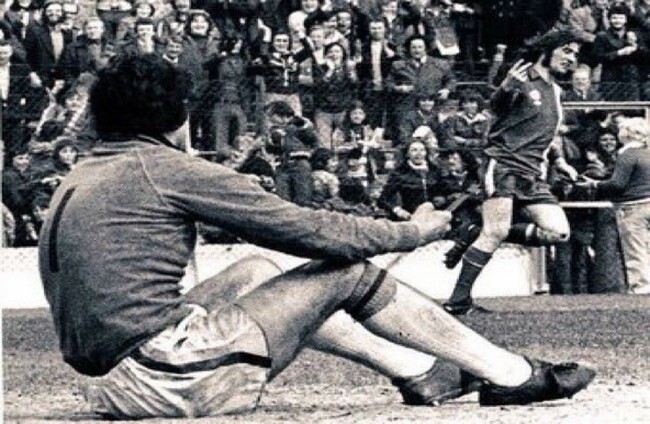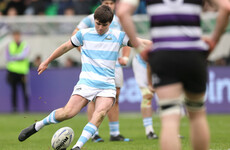IN EALING, WEST LONDON there’s a place called Walpole Park, a sprawling 28-acre open space.
On one side, nestled on the Green, there’s the legendary and longstanding Ealing Studios – a pillar of British film history. Close by is the University of West London, which occupies the site of the old Ealing Art College and where Pete Townsend, Ronnie Wood and Freddie Mercury were all students.
When it comes to pop culture, the neighbourhood is rife with references.
So fittingly, on the other side of the park, there’s a tree and underneath is a simple plaque. Blink and you’ll miss it.
“In memory of Robin Friday
1952-1990
Love Maxine & Nicola Friday”
Not many are aware of the memorial. Perhaps if there was more detail to the message, it would attract more passing interest? Then again, nobody has ever really known much about Robin Friday. So perhaps it’s perfect the way it is.
Some things are irrefutable. For a time in the mid-1970s, Friday was a footballer for Reading and, briefly, Cardiff. But he was mythical, even then. There was his on-field behaviour – the remarkable flicks, tricks and goals from every angle. But unless you were at the games, Friday existed merely in the abstract. Reading were in the Fourth Division (though thanks to their maverick attacker they would gain promotion in 1976) and went largely ignored, as did Friday’s story.
When he died of a heart attack – suspected to have been brought on by a heroin overdose – at Christmas time in 1990, aged just 38, there was a brief mention of him in the national newspapers and nothing more.
“Robin Friday, footballer, died London, 31 December, aged 38. Scored 52 goals in 142 League appearances for Reading and Cardiff City during the 1970s.”
Information was scarce regarding what he’d been up to since walking out of Cardiff in 1977. There had been more prison time, for impersonating a policeman and confiscating people’s drugs for his own use. There had been a third marriage and subsequent separation. Then in the mid ’90s, many of the blanks were filled in and Friday’s cultish persona was properly finessed.
When Graham Wray wrote a feature on Friday for football magazine Goal, the unlikely pairing of music journalist Paolo Hewitt and Oasis bassist Paul McGuigan were inspired to work on a book together and the resulting 1997 biography, ‘The Greatest Footballer You Never Saw’, is the definitive insight into Friday’s life. In between those two developments, there was another indie connection as Cardiff outfit Super Furry Animals – who were label mates of Oasis at Creation Records – released a single called The Man Don’t Give A Fuck and stuck an iconic photograph of Friday on the front cover.
It was a moment that perfectly summed him up. It was April 16, 1977 at Ninian Park and having had a verbal joust with Luton Town goalkeeper Milija Aleksic moments earlier, Friday dispossessed a defender, raced towards goal, rounded Aleksic, rolled the ball to the net for his second of the game and celebrated by flicking a ‘V’ sign at the crumpled goalkeeper. Somebody was smart enough to snap the image and it’s now part of football folklore.
“That was him, that was him to a tee,” says Ards Peninsula native Bill Irwin, Cardiff’s goalkeeper who’d been at the club for five years by the time Friday arrived at the very end of 1976.
He marched to the beat of his own drum. He had the long hair, the tight jeans, the cowboy boots and he’d walk around in a full-length fur coat. Totally different. Anti-establishment.”
“The guy was hugely talented. He’d do things you would never expect players to do. The only other person who could and would do it would have been Bestie. Robin would get the crowd excited with his nutmegs and all of that stuff. And he was a centre-back’s nightmare because the more you kicked him, the more determined he was and the angrier he got and you just didn’t know what he’d do next. Sometimes you get goalscorers who’d get kicked around by centre-halves and would disappear from a game. But not Robin. The more they kicked him, the more he got after them. He was a goalscorer but he dropped deeper and I think he could have been a very good ’10′, if he had the discipline. He had a great mind, great vision, was very, very skilful, very technical and brave. He was close to six foot but lean and had good muscle definition. He was bandy-legged and the socks were always rolled down. So streetwise. Everything he did was probably off the cuff. He was blessed with a talent.”
Friday had loved Reading and Reading loved him back the same way. He’d been plucked from non-league football by imposing Corkman Charlie Hurley, though the boss had reservations. He’d heard stories about Friday’s personality and social habits. Still, he took the gamble and signed him as an amateur in early 1974. But a star was quickly born and he proved a sensation once Hurley handed him a debut against Northampton. The legend goes that when Hurley broke the news to him, Friday told him he’d be a model pro in advance of the game.
“I’ll stay home, I won’t drink, I won’t fight,” he said.
Hurley, having never lost his Cork drollness and well-aware that keeping Friday on a leash was a hopeless endeavour, responded with a killer line.
“Robin, I don’t mind you lying to me, but not three times.”
Over time, Hurley learned of Friday’s startling back story: the 14-month stint spent in borstal at Feltham Prison for theft when he was a teenager. The drug-taking. The inter-racial marriage to Maxine when he was still in his teens – and the daughter, Nicola, that followed soon after. The accident that should have killed him at 20 when he fell off a roof and impaled himself on a spike that just missed his lung. Many, including his biographer Paolo Hewitt, pointed to the latter episode as a seismic one which led to Friday realising how precious life was. From that point on, everything accelerated. There was a spell at a hippie commune during the off-season one summer and in 1976, Hurley tried to persuade Liza Deimel, Friday’s girlfriend, from marrying him – to little avail. The wedding, inevitably, was bizarre with the groom having smoked a spliff on the steps of the church before the ceremony and the bride having taken a cocktail of pills with her bridesmaid. The afterparty followed a similar pattern and descended into a drug-infused mess.
Despite Friday’s innate talent, Hurley eventually lost patience with the chaos that always seem to accompany him. But trying to find a buyer proved difficult. Infamy, after all, is difficult to spin. So when Cardiff – then plying their trade in the second tier – and their manager Jimmy Andrews expressed an interest in late-1976, Friday was offloaded.
And just a few weeks later, on New Year’s Day, it seemed a very shrewd acquisition.
Facing a vibrant Fulham at Ninian Park, Friday’s debut saw him come up against World Cup winning captain Bobby Moore. It proved quite the afternoon too. An undeterred Friday introduced himself by grabbing Moore’s balls. Later, he embarrassed the World Cup-winning captain further by scoring twice in a 3-0 win. The game should have pitted Friday against George Best – a player many compared him with, but he withdrew late because of injury. Though the previous night’s festivities was more than likely the cause of his absence.
“That’s the sort of thing Robin would do,” Bill Irwin says.
“He’d grab you by the balls and just laugh. I got on well with him but if he took a dislike to you, he might just walk across and punch you. We trained across the road from Ninian Park and we were heading across one morning and he pointed to one of the lads and said, ‘I’m gonna break his leg today’. I said to him, ‘Robin, you can’t do that, he’s your team-mate and we need him for Saturday’. And he just said, ‘Nah, I don’t like him’. He was hard as nails. He’d say after training, ‘Can you give me a lift to the train station?’ I’d drive him down and he’d turn to me and say, ‘Come on – I’ll get you a beer’. I’d say, ‘No, no – you’re okay’. But he’d say it again and you just ended up going because he might turn around and smack you if you upset him. He might have kicked the shit out of the car. He’d tear it up on the field but then the red mist would come over him and he’d end up with a yellow card or even get sent-off. He was so volatile and wild. You never knew what would happen. But it’s a shame. The drugs and all of that. It was wasted talent.”
Friday, who was from Acton – a half an hour walk from Walpole Park – was a home-bird and desperately longed for London throughout his time in Cardiff. He never settled and would occasionally call Charlie Hurley and ask to come back to Reading. He respected Hurley’s management style and he responded to a disciplinarian, an uncompromising figure. Under Jimmy Andrews, he didn’t have that. And perhaps the step up didn’t necessarily suit him either. This was the old Second Division that still boasted a collection of heavyweights – Chelsea, Nottingham Forest, Wolves.
Cardiff, as regular Welsh Cup champions, also tasted European football consistently and frequently appeared in the Cup Winners’ Cup. Earlier in the season they’d faced Swiss side Servette before bowing out to Dynamo Tbilisi.
“A few years before I arrived, Cardiff lost narrowly to Real Madrid,” Irwin says.
Maybe it’s just as well Robin wasn’t there when we went on those trips. Especially if it had been in Russia. We all might have been locked up.”
“Robin was so talented but maybe the opposite of what Jimmy had dealt with. He followed the rules and was so consistent. I mean, Jimmy couldn’t handle me at times because him and I fell out. But I was pretty docile compared to Robin. He was at the other end of the spectrum. I don’t think Jimmy was equipped to deal with him but would he have been the only one? I doubt it. He turned up one day at ten to three. The gaffer said, ‘You’re not playing’. And he was just defiant – ‘I am playing’. And that was it. I can’t remember the game but I think he went out and scored and we won.”
“It needed someone like a Charlie Hurley or a Harry Gregg – someone old-school. Charlie wouldn’t have taken any nonsense. He needed somebody who was very strong and who wouldn’t step down. But, I think he brought something to the team that we didn’t have. He brought something that other sides would have to prepare for. They needed to take care of him and that might open up somebody else.”
“He never moved down to Cardiff and the story goes that he travelled back and forth on the train to London using a platform ticket that you’d get if you wanted to wave someone off. He’d just jump on board and then dodge the inspectors. Training would start at 10am so he’d get an express train and he’d probably have to leave at seven in the morning. Now, I shared a flat with a couple of other guys and I wouldn’t have exactly wanted Robin as a room-mate. I wouldn’t have been at the front of the line offering him a place to stay.”
Friday’s time at Cardiff was brief. He never even managed a full season and Andrews eventually cut the chord early in the following campaign. There were too many incidents, too many bizarre occurrences with Friday at the centre of them. On one occasion, the players gathered together in the bath after a game when it became clear Friday had defecated in it.
Having missed pre-season because of a virus that saw him lose two stone, he was available for a game against Brighton in October. But in a 4-0 thumping loss, Friday was kept under control by Mark Lawrenson. Wound up after yet another tackle, he retaliated by kicking Lawrenson in the face. A red card quickly followed, as did the end of his professional career.
“Kicking someone in the face? I mean, in today’s world that would be a law suit, wouldn’t it? says Irwin.
“He came in with a flourish and left with a flourish. He could have graced the field for a long time because I think he was blessed with something. But other things clouded that, whether it was his mental approach or whatever. As a kid, he probably had to fight his way out and that stayed with him. He didn’t care what anyone thought of him. And you have to admire him for that. And I still do.”
At times he was crazy, at other times he was nice. Maybe he was bi-polar? I’m not saying he was but you just never knew his mood. He trained hard, worked hard. We all played because we loved it but I think he played because it was a way to make some money. That’s reading between the lines. In the end, I think he just stopped turning up.”
This year marks the thirtieth anniversary of Friday’s death and in the last while, there have been various attempts to turn his story into a film. Many tried something similar with Best and the reason is obvious – how could a yarn stocked with sex, drugs and football be anything other than a box-office smash? However, in Best’s case, because the story is so well known and because it’s genuinely stranger than fiction, the traditional biopic can easily become a parody. That’s what happened in 2000 with the release of Best, starring John Lynch (and Roger Daltrey as Rodney Marsh) in the title role. When the subject was later asked his thoughts, he replied with a wry smile and said, after a pregnant pause, ‘The music is good’.
Despite the details Hewitt and McGuigan pieced together in 1997, Friday remains a myth and the strength of his cultishness is in what we don’t know. There is a minuscule amount of footage – the majority of it grainy and unreliable. Even a glorious goal he scored for Reading against Tranmere in 1976 – an apparently inexplicable strike that saw him control a ball on his chest and volley ludicrously to the top corner from 35 yards without turning is only as good because nobody’s ever seen it.
He is, appropriately enough given the amount of time he spent in them, a perfect pub discussion. How good could he have been? It’s a question that nobody knows the answer to, even those that played alongside him. However, given his personality, it makes complete sense that Robin Friday would gladly have burned out before fading away, leaving a litany of women, pills and drained pint glasses in his wake.
“Robin was one of a kind,” Irwin says.
That’s quite a statement, given Irwin played with and against some of the world’s greatest – and curious – players, particularly during his time in the NASL.
“I don’t think there’s been anyone like him before or since. The picture that always comes to mind is the front of that single and him flicking the ‘V’ sign at the Luton goalkeeper. And him standing in the dressing room in that full-length fur coat.”
Maybe he missed his calling? Because you could liken him to a Mick Jagger or a Keith Richards. He was a rock ‘n’ roll footballer. That was the era, wasn’t it? He looked more like a rock star than a soccer player. Shoulder-length hair, a little wavy. And he always had a seven o’clock shadow. The boots. The tight Levi jeans – I don’t think I ever saw him wearing anything else. A ’70s person, definitely. But if he was alive today, he’d be the exact same. The long hair would still be there. Muscles would still be defined. I think he was one of those people that never put on weight. So he’d just be the same. The clothes wouldn’t have changed. He’d be a holdover from the ’70s. An old hippie.”
It sounds about right. The man who didn’t give a fuck. Through all of the complexities, maybe he was actually quite straightforward?
And maybe the memorial in Walpole Park is the ideal tribute.
The42 is on Instagram! Tap the button below on your phone to follow us!















Delighted for the lad! Would be great if in the future more young Irish players could come back for half a season play some LOI and go back with that bit of experience, seems to have done Eoghan no harm
Ambrose and boyata are both a liability,simunovic still an unknown quantity so I’d say it’s a toss up between o Connell and kolo to partner sviatchenko.would be great to see eoghan nail down a regular spot and continue his progress
That is brilliant news for Celtic and Ireland.
I watched the match – O’Connell showed great character throughout the game.
Can’t but read Rogers interview in his voice
Lads…. were ye watching a different game,,, he was 100% to blame for the goal…. lost his man completely
Blueman, you’re right, the goal was his fault but his head didn’t go down after it as most young players would and he went from strength to strength as the game went on.
It’s a zonal marking system, therefore no man to lose. Although he could have been better for it so could every other defender in the box and if Gordon stayed on his line maybe it wouldn’t have been a goal so 100% is very harsh on the the young fella. For a 20 y/o making his first European start in a notoriously tough place to go he done very little wrong and was one of Celtics better players. If you were watching the match and not just the goal you would have seen that!
O Connell did well all things taken into account,good result to take back to glasgow
Fact is the goal was his fault, you can dress it up anyway you want,… football at the highest level is a harsh game, and goals decide games, if he wasn’t a young irish player playing for celtic , people wouldn’t be raving about his performance and making excuses for his defending for the goal… think we need to take off the green white and gold glasses here…. and I did watch the full game
Blueman there’s nobody bigging him up.if simunovic can be kept fit and playing regularly,o connell won’t get much game time.at the moment he’s the pick of a bad bunch and just a potentially good defender
Blueman get a grip ffs. He’s 20 years of age, made one or two small mistakes in the biggest game of his career to date. Start blaming the young man now and giving him abuse about the goal could shatter his confidence, that’s why he’s being praised. Attitudes like yours is the reason a lot of talented youngsters don’t make it in the game!
Hahaha…. one or two small mistakes???… wouldn’t call losing his man for a goal in a champions lge game a small mistake. … its quite a significant one. If young pros can’t take a bit of criticism they may as well forget about a career in the game…. and I thought he he will let a bit of criticism on the 42 get to him… if he he was that type of character he would never have made it this far
You said people wouldn’t be raving about his performance if he wasn’t Irish or playing for Celtic. Well this is an Irish site and an article about Celtic, so obviously people who have a better understanding of the game than yourself (and people who really watched the game) think he merits praise for his performance! And if you’re a Celtic supporter you should be ashamed of yourself :-/
I am not a celtic fan … I am looking at the game… which I watched in full from an unbiased point of view… it’d obvious your biased towards him, , and if u can’t see he was at fault for that goal than it is you who doesn’t really know that much about football….